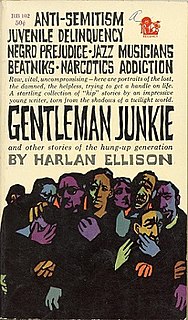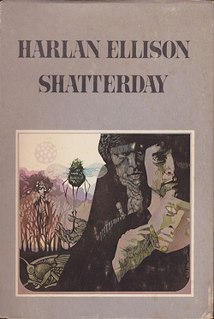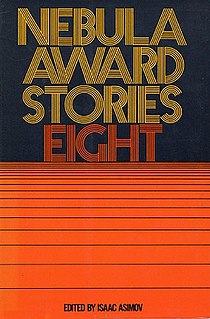
Harlan Jay Ellison was an American writer, known for his prolific and influential work in New Wave speculative fiction and for his outspoken, combative personality. Robert Bloch, the author of Psycho, described Ellison as "the only living organism I know whose natural habitat is hot water."
Reginald Bretnor was an American science fiction author who flourished between the 1950s and 1980s. Most of his fiction was in short story form, and usually featured a whimsical story line or ironic plot twist. He also wrote on military theory and public affairs, and edited some of the earliest books to consider SF from a literary theory and criticism perspective.

A Boy and His Dog is a cycle of narratives by author Harlan Ellison. The cycle tells the story of an amoral boy (Vic) and his telepathic dog (Blood), who work together as a team to survive in the post-apocalyptic world after a nuclear war. The original 1969 novella was adapted into the 1975 film A Boy and His Dog directed by L. Q. Jones. Both the story and the film were well-received by critics and science fiction fans, but the film was not successful commercially. The original novella was followed by short stories and a graphic novel.

"I Have No Mouth, and I Must Scream" is a post-apocalyptic science fiction short story by American writer Harlan Ellison. It was first published in the March 1967 issue of IF: Worlds of Science Fiction.

Again, Dangerous Visions (1972) is a science fiction short story anthology, edited by American author Harlan Ellison. It is the follow-up to Dangerous Visions (1967), also edited by Ellison. Cover art and interior illustrations are by Ed Emshwiller.

The Hugo Winners was a series of books which collected science fiction and fantasy stories that won a Hugo Award for Short Story, Novelette or Novella at the World Science Fiction Convention between 1955 and 1982. Each volume was edited by American writer Isaac Asimov, who wrote the introduction and a short essay about each author featured in the book. Through these essays, Asimov reveals personal anecdotes, which authors he's jealous of, and how other writers winning awards ahead of him made him angry. Additionally, he discusses his political beliefs, friendships, and his affinity for writers of "hard science fiction". The first two volumes were collected by Doubleday into a single book, which lacks a publishing date and ISBN.

Gentleman Junkie and Other Stories of the Hung-Up Generation is an early collection of short stories by Harlan Ellison, originally published in paperback in 1961. Most of the stories were written while Ellison was a draftee in the United States army between 1957 and 1959. These were sold to Rogue Magazine, a pulp fiction magazine of the era. Other stories in the collection had appeared previously in publications ranging from Alfred Hitchcock's Mystery Magazine to a Chicago weekly newspaper.

William Lawrence Hamling was an American writer, science fiction fan, and publisher of both science fiction digests, and adult magazines and books, active from the late 1930s until 1975. He was a lifelong member of First Fandom.

"Gramma" is the first segment of the eighteenth episode from the first season (1985–86) of the television series The Twilight Zone. This segment, about a boy who is afraid of his grandmother, is based on the short story of the same name by Stephen King, published in the collection Skeleton Crew (1985).

Paingod and Other Delusions is a collection of short stories by American writer Harlan Ellison. It was originally published in paperback in 1965 by Pyramid Books. Pyramid reissued the collection four times over the next fifteen years, with a new introduction added for a uniform edition of Ellison books in 1975. Ace Books issued an edition in 1983. The collection's only hardcover edition is The Fantasies of Harlan Ellison, which compiles it together with Ellison's "I Have No Mouth and I Must Scream".

Ellison Wonderland is a collection of short stories by author Harlan Ellison that was originally published in 1962. Gerry Gross bought the book from Ellison in 1961, providing him with the funds he needed to move to Los Angeles. Subsequent payments after the book was published supplied the author with enough money to survive until he was able to find a job writing for a television series. It was later reprinted in 1974 by New American Library with an introduction by Ellison.

Shatterday is a collection of short stories by American author Harlan Ellison. In the introduction, Ellison states that the stories reflect an underlying theme of fear of human frailty and ugliness. His goal, he writes, is to shock his readers into seeing that this fear unifies all people. Each story has an introduction, ranging from a single sentence to several pages long.

Approaching Oblivion is a collection of eleven short stories by American author Harlan Ellison. They had appeared in various magazines throughout the early 1970s with the exceptions of "Paulie Charmed the Sleeping Woman" which originally appeared in 1962 and "Ecowareness" which was previously unpublished.
"The Discarded" is a science fiction short story by American writer Harlan Ellison. It was first published in the April 1959 issue of Fantastic and was later included in the 1965 short story collection Paingod and Other Delusions and the third volume of the audiobook collection The Voice From The Edge.

The Collected Stories of Philip K. Dick is a collection of 118 science fiction stories by American writer Philip K. Dick. It was first published by Underwood-Miller in 1987 as a five volume set. See Philip K. Dick bibliography for information about the mass market reprints.

The Deadly Streets is a collection of short stories published by author Harlan Ellison in 1958.
The Voice From the Edge is a series of audiobooks collecting short stories written and narrated by American author Harlan Ellison. The first two volumes were published by Fantastic Audio; they were republished by Blackstone Audio in 2011. The uploading of these audio books to a newsgroup on the internet led to a court case to decide the liability of a service provider according to the Digital Millennium Copyright Act. The fourth volume was published by Audible.

Nebula Award Stories Eight is an anthology of science fiction short works edited by American writer Isaac Asimov. It was first published in hardcover in November 1973, in the United States by Harper & Row and in the United Kingdom by Gollancz. The British edition bore the variant title Nebula Award Stories 8. Paperback editions followed from Berkley Medallion in the U.S. in September 1975, and Panther in the U.K. in the same year; both paperback editions adopted the British version of the title. The book has also been published in German.

Nebula Award Stories 11 is an anthology of science fiction short works edited by Ursula K. Le Guin. It was first published in the United Kingdom in hardcover by Gollancz in November 1976. The first American edition was published in hardcover by Harper & Row in February 1977. Paperback editions followed from Corgi in the U.K. in July 1978, and Bantam Books in the U.S. in August 1978. The American editions bore the variant title Nebula Award Stories Eleven.
This is a list of works by Harlan Ellison (1934–2018). It includes his literary output, screenplays and teleplays, voiceover work, and other fields of endeavor.
















